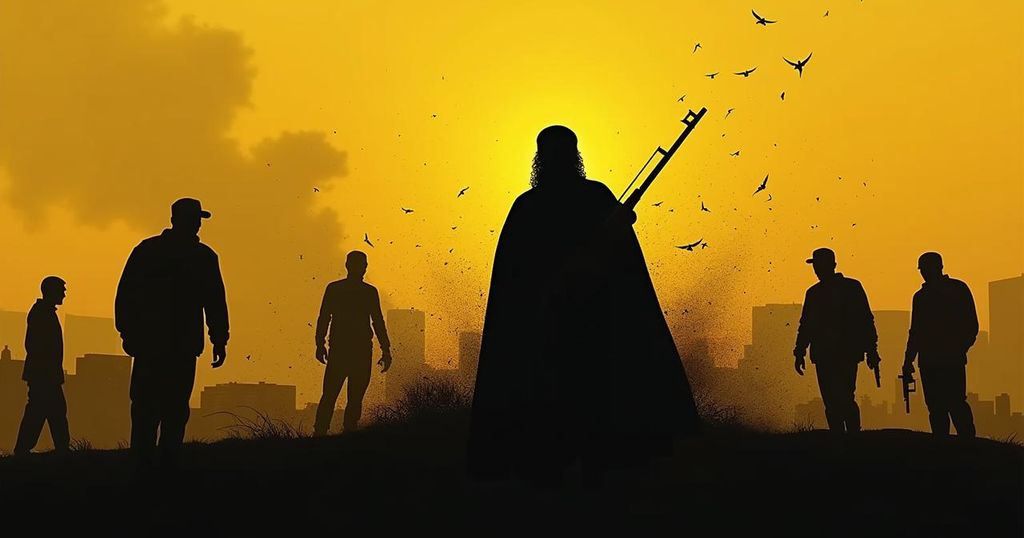Hezbollah leader Hassan Nasrallah was confirmed killed by an Israeli airstrike in Beirut. His death marks a significant escalation in the Israel-Hezbollah conflict, which has intensified recently. Israel claims the operation was conducted based on extensive intelligence, resulting in significant casualties and prompting fears of immediate retaliation from Hezbollah. Overall, the situation leads to widespread displacement and a deepening humanitarian crisis in Lebanon.
On Saturday, Hezbollah, the Lebanese militant group, confirmed the death of its leader, Hassan Nasrallah, resulting from an Israeli airstrike in Beirut. The airstrike occurred on Friday, targeting Hezbollah leadership during a meeting in their Dahiyeh headquarters. In their statement, Hezbollah stated that Nasrallah has “joined his fellow martyrs,” reaffirming their commitment to continue their fight against Israel and in support of Palestine. Nasrallah, who had been at the helm of Hezbollah for over three decades, represents one of the most significant figures to be killed by Israel amid the ongoing conflict. The Israeli military has indicated that the airstrike was a precise operation based on comprehensive intelligence and surveillance. The strikes resulted in casualties, with the Lebanese Health Ministry reporting six deaths and 91 injuries. Among those killed was Ali Karki, the commander of Hezbollah’s Southern Front, alongside other senior commanders. The airstrike also reportedly took the life of Abbas Nilforushan, a general in Iran’s Revolutionary Guard, adding to the tensions and implications of the strike. As violence escalates, residents across Beirut expressed a mix of grief and disbelief at Nasrallah’s death, with many taking to the streets to fire in mourning. Concurrently, Israeli forces indicated that they would intensify operations against Hezbollah, with Israel’s Chief of Staff suggesting that the elimination of Nasrallah was merely a strategic maneuver in a broader offensive. The increased military mobilization in Israel precedes the formal recognition of war objectives, underscoring the gravity of the situation. Despite the loss of their leader, the potential for retaliatory attacks by Hezbollah remains high, as seen in recent engagements where both sides have exchanged fire significantly. This dramatic escalation of hostilities raises concerns about future acts of violence and the broader implications for Lebanon and the region as a whole. The casualties and destruction wrought by ongoing attacks illustrate the urgent humanitarian crisis developing in the area. Recent assessments indicate that more than 200,000 Lebanese citizens have been displaced as a result of the conflict in just one week, demonstrating the widespread impact of the violence. In summation, the assassination of Hassan Nasrallah signifies a pivotal moment in the escalating conflict between Israel and Hezbollah, heralding a potential intensification of military operations and complex geopolitical ramifications relevant to Iran and Lebanon. Israel’s assault strategy appears to be firmly directed at dismantling Hezbollah’s capabilities while addressing their defense objectives, yet the forthcoming response from Hezbollah and Iranian authorities will likely shape the further development of this conflict.
This incident occurs amidst growing hostilities between Lebanon’s Hezbollah and Israel, escalating significantly since October when Hezbollah began firing rockets in coordination with Hamas. The recent assassination of Nasrallah represents a pivotal escalation, as it targets one of the most powerful and longstanding leaders of Hezbollah. Israeli airstrikes have intensified following the resumption of conflict, which has already resulted in heavy casualties and mass displacement on both sides. The complex interplay of military strategy, political implications, and regional power dynamics underscores the precarious nature of the situation.
The confirmation of Hassan Nasrallah’s death marks a critical juncture in the ongoing conflict between Israel and Hezbollah. The airstrike signifies Israel’s strategic intent to neutralize Hezbollah’s leadership while asserting military dominance in the region. However, the subsequent potential for increased violence and the humanitarian crisis exacerbated by the ongoing strikes pose significant challenges for both Lebanon and the underlying stability of the Middle East.
Original Source: www.pbs.org






